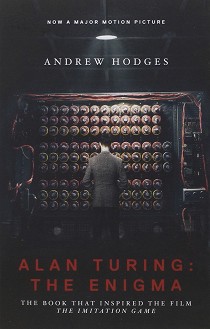The book that inspired the film "The Imitation Game".
A "New York Times" bestseller.
It is only a slight exaggeration to say that the British mathematician Alan Turing (1912 - 1954) saved the Allies from the Nazis, invented the computer and artificial intelligence, and anticipated gay liberation by decades-all before his suicide at age forty-one. This "New York Times" bestselling biography of the founder of computer science, with a new preface by the author that addresses Turing’s royal pardon in 2013, is the definitive account of an extraordinary mind and life.
Capturing both the inner and outer drama of Turing's life, Andrew Hodges tells how Turing's revolutionary idea of 1936 - the concept of a universal machine - laid the foundation for the modern computer and how Turing brought the idea to practical realization in 1945 with his electronic design. The book also tells how this work was directly related to Turing’s leading role in breaking the German Enigma ciphers during World War II, a scientific triumph that was critical to Allied victory in the Atlantic. At the same time, this is the tragic account of a man who, despite his wartime service, was eventually arrested, stripped of his security clearance, and forced to undergo a humiliating treatment program - all for trying to live honestly in a society that defined homosexuality as a crime.
The inspiration for a major motion picture starring Benedict Cumberbatch and Keira Knightley, "Alan Turing: The Enigma" is a gripping story of mathematics, computers, cryptography, and homosexual persecution.
Reviews

"Scrupulous and enthralling."
A. O. Scott, New York Times"One of the finest scientific biographies ever written."
Jim Holt, New Yorker"Andrew Hodges' book "Alan Turing: The Enigma", is the indispensable guide to Turing's life and work and one of the finest biographies of a scientific genius ever written."
Michael Hiltzik, Los Angeles Times"Turing's rehabilitation from over a quarter-century's embarrassed silence was largely the result of Andrew Hodges's superb biography, Alan Turing: The Enigma (1983; reissued with a new introduction in 2012). Hodges examined available primary sources and interviewed surviving witnesses to elucidate Turing's multiple dimensions. A mathematician, Hodges ably explained Turing's intellectual accomplishments with insight, and situated them within their wider historical contexts. He also empathetically explored the centrality of Turing's sexual identity to his thought and life in a persuasive rather than reductive way..."
Michael Saler, Times Literary Supplement"On the face of it, a richly detailed 500-page biography of a mathematical genius and analysis of his ideas, might seem a daunting proposition. But fellow mathematician and author Hodges has acutely clear and often extremely moving insight into the humanity behind the leaping genius that helped to crack the Germans' Enigma codes during World War II and bring about the dawn of the computer age... his melancholy story is transfigured into something else: an exploration of the relationship between machines and the soul and a full-throated celebration of Turing's brilliance, unselfconscious quirkiness and bravery in a hostile age."
Sinclair McKay, Wall Street Journal"A first-class contribution to history and an exemplary work of biography."
I. J. Good, Nature"An almost perfect match of biographer and subject... (A) great book."
Ray Monk, Guardian




